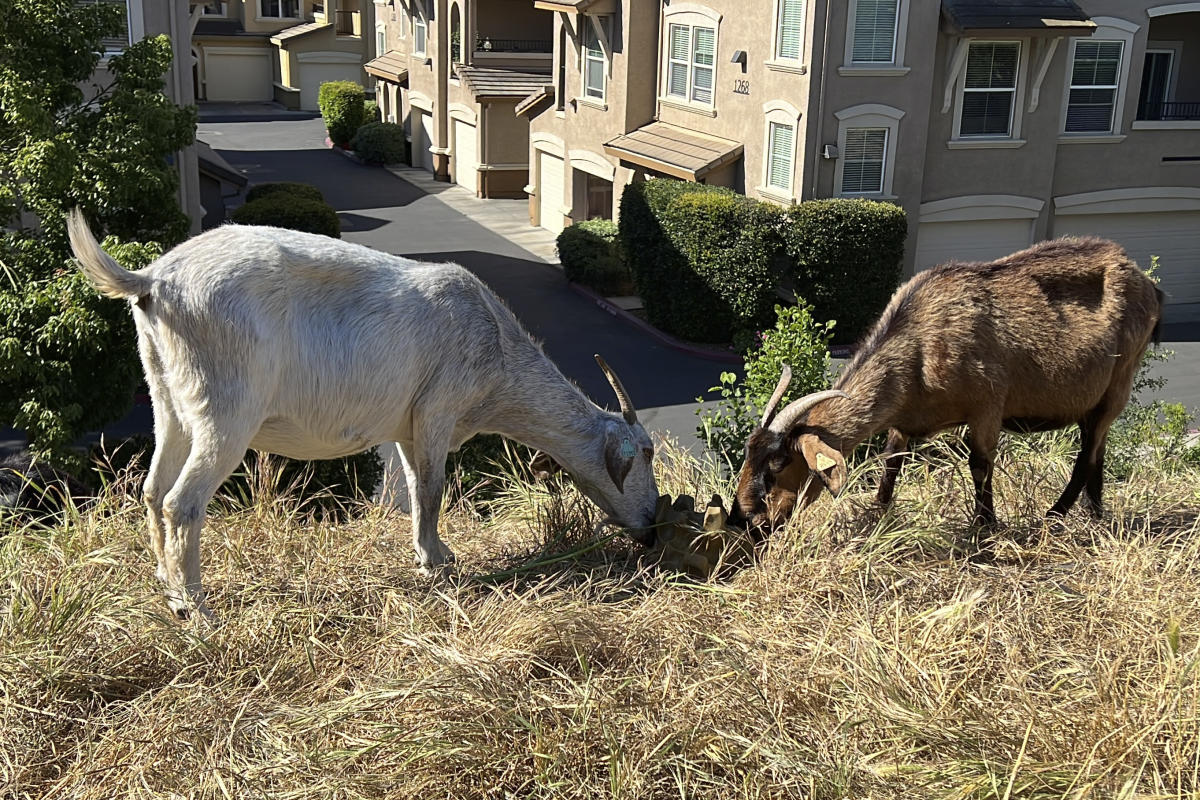Global Courant 2023-05-30 15:10:12
WEST SACRAMENTO, Calif. (AP) — Hundreds of goats munch on long blades of grass on a hillside next to a sprawling mansion complex. They were hired to remove vegetation that could fuel wildfires as temperatures rise this summer.
These voracious herbivores are in high demand to devour weeds and shrubs that have spread throughout California after a winter with drought by heavy rain and snow.
“It is a huge source of fuel. If left untamed it can grow very high. And then when the summer dries everything out, it’s the perfect fuel for a fire,” says Jason Poupolo, a park superintendent for the city of West Sacramento, where the goats recently grazed.
Targeted grazing is part of California’s strategy to reduce wildfire risk because goats can eat a wide variety of vegetation and graze on steep, rocky terrain that is difficult to access. Backers say they are an environmentally friendly alternative to chemical herbicides or weed killers that make noise and pollute.
But new state labor rules make it more expensive to graze goats, and herders say the rules threaten to put them out of business. The changes could raise herders’ monthly salaries from about $3,730 to $14,000, according to the California Farm Bureau.
Companies typically put about one herder in charge of 400 goats. Many of California’s herders are from Peru and live in employer-provided trailers near pastures. Labor advocates say the state should investigate the working and living conditions of goat herders before changing the law, especially since the state funds goat grazing to reduce the risk of wildfires.
California is investing heavily in wildfire prevention after years of destructive flames ravaged the state that scorched millions of acres, destroyed thousands of homes and killed dozens. Goats have been used to clean up fuel around Lake Oroville, along Highway 101, and near the Ronald Reagan Presidential Library.
Story continues
“My phone is ringing this time of year,” said Tim Arrowsmith, owner of Western Grazers, which provides grazing services to West Sacramento. “Demand has grown year after year after year.”
Based in the Northern California town of Red Bluff, his company has approximately 4,000 goats for hire to clear vegetation for government agencies and private landowners in Northern California. Without a solution to the new regulations, “we will be forced to sell these goats to slaughter and to auctions, and we will go out of business and probably file for bankruptcy,” Arrowsmith said.
Companies have traditionally been allowed to pay goat and sheep herders a monthly minimum wage instead of an hourly minimum wage because their jobs require them to be available 24 hours a day, seven days a week. But the legislation signed in 2016 also gives them the right to overtime. It effectively raised the herders’ minimum monthly wage from $1,955 in 2019 to $3,730 this year. According to the California Department of Industrial Relations, it will reach $4,381 by 2025.
So far, the ranchers who sued the law have passed most of the increased labor costs on to their customers.
But in January those wage costs will rise sharply again. Goat herders and sheep herders have always followed the same work rules last year. But a government agency has ruled that this is no longer allowed, meaning goat herders would be subject to the same labor laws as other farm workers.
That would mean that goat herders would be entitled to increasingly higher wages – up to $14,000 a month. Last year, a budget trailer bill delayed that wage demand by a year, but it will take effect January 1 if nothing is done to change the law.
Goat herders say they can’t afford to pay herdsmen that much. They would have to raise their rates drastically, making it unaffordable to graze goats.
“We fully support raising wages for herders, but $14,000 a month is not realistic. So we need to address that to enable these goat grazing operations,” said Brian Shobe, deputy policy director for the California Climate and Agriculture Network.
The goat grazing industry is urging the legislature to pass legislation that would treat goat herders the same way as sheep herders. A bill to do so has not yet received a public hearing.
Lorena Gonzalez Fletcher, head of the California Labor Federation, said goat herders are among the “most vulnerable workers in America” because they have temporary work visas and can be fired at any time and sent back to their home countries. Most work in isolation, speak minimal English and do not have the same rights as Americans or green card holders.
“We have a responsibility as a public to make sure that every worker who works in California is treated with dignity and respect, and that includes these goat herders,” said Gonzalez Fletcher, who sponsored the overtime bill for farm workers when she was a state councilor who represented San Diego.
Arrowsmith employs seven goat herders from Peru under the H-2A temporary farm worker visa program. He said the herders get about $4,000 a month and don’t have to pay for food, housing or phones.
“I can’t pay $14,000 a month to an employee starting January 1. There just isn’t enough money. The cities can’t bear that kind of cost,” Arrowsmith said. “What’s at stake for the public is that your house could burn down because we can’t put out the fire.”








